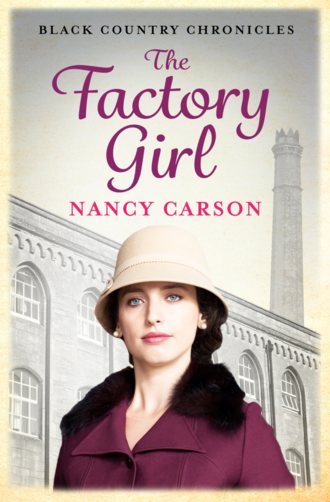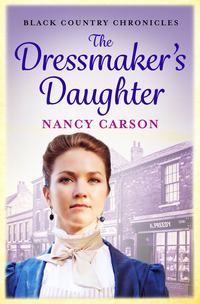
Полная версия
The Factory Girl
A black and white mongrel appeared and sniffed at her apron. She bent down and stroked its neck, and it trotted away contentedly across the street to the market stalls. ‘We were lucky, Billy. Our mom always goes out on a Saturday night and, by the time she got back, me and Alice were in bed. As far as she was concerned, we had a great night.’
‘And your dad? Was he still up?’
‘We haven’t got a dad, Billy.’
‘Oh. Sorry for mentioning it, Henzey. Trust me to put me foot in it. Really, I’m sorry.’
‘Oh, it’s all right. You weren’t to know.’
‘Anyway, fancy those two gawbies spiking your drinks. You’re best off without the likes of Andrew and George.’
She tutted diffidently. ‘I know that now, but when somebody asks you out, you expect them to behave like gentlemen. You expect to be able to trust them a little bit. Or am I just being naïve?’
‘I think you were unlucky. Haven’t you got a regular sweetheart, Henzey?’
‘Not since the party.’
‘Get away with you! I can scarcely believe that. Somebody as lovely as you? Men must be falling at your feet.’
She gave a dispirited little laugh. ‘Flattery will get you everywhere, Billy. I was going out with somebody but, because I wouldn’t go to the Palais with him on the night of that party, I haven’t seen him since. Shame really. I wish I’d gone with him now. I expect he thought I was mucking him about.’
‘Never mind, Henzey. Just keep smiling. You’ve got a lovely smile, you know. It’s your fortune, believe me.’ His eyes lingered on her face for a second or two. ‘Ah well, I’d best be off. Give me regards to your Alice, will you? You never know, I might pop and see you again sometime.’
‘Oh, anytime, Billy. Any time you’re passing. It’s grand to see you again.’
Henzey could hardly believe Billy Witts had actually called on her. She could hardly believe he remembered her at all. Her heart danced, wondering why. Could he be interested in her? If not, why had he called? As he walked away, she admired his physique. He was tall, slim and athletic-looking. Henzey liked tall men. At five feet six in her stockings, an inch or two taller in her heels, she was bound to. She especially liked tall men who were clean shaven, devoid of moustaches, tattoos and other adornments she considered superfluous. Billy Witts qualified nicely. Always he was immaculate. He was courteous, too – to her at least – and that implied far more masculinity than brashness or well-developed muscles. Any woman would fancy him. When he smiled, his eyes creased and twinkled, and she felt she would be able to trust him with her life. He was about twenty-four, she reckoned. Funny, though, but every new man she fancied seemed to be significantly older than the one before.
Seeing Billy Witts, so unexpectedly, lifted Henzey from her melancholy over Jack Harper and clarified the murkiness. But it also stirred up the loathing she felt for Nellie Dewsbury.
That feeling was intensified when one Tuesday – it was the 16th of October – Henzey and Clara Maitland went to join the crowds for the official opening of Dudley’s new Town Hall. Stanley Baldwin, the Prime Minister was there to perform the opening ceremony. All the local dignitaries were present, and the two friends had insinuated themselves into a good place to view the proceedings, lining the steps to the new entrance. Over the heads of the crowds they could see a cavalcade of cars approaching. There was a buzz of excitement as, one by one, the cars pulled up. At last Mr Baldwin stepped out with the Mayor of Dudley and Lady Mayoress, to some cheers and, predictably, some jeers. Four cars later, a man with a ruddy complexion alighted with his wife and another, younger, trim-looking girl. Henzey saw, to her great surprise, that it was Nellie Dewsbury.
Henzey nudged Clara urgently. ‘Look! There’s that Nellie Dewsbury I told you about,’ she whispered. ‘That must be her mother and father.’
As she swanked up the steps, Nellie caught sight of Henzey just a few feet away and gave her a look that would have withered a lesser mortal. Then she stuck her nose in the air and strutted uppishly into the Town Hall.
‘I see what you mean,’ Clara remarked. ‘Snotty devil, isn’t she?’
‘I hate her. Oh, I hate her. Did you see her? Did you see how snooty she was?’
‘She’ll get her comeuppance, Henzey. That sort always do.’
Henzey smiled, her annoyance abating. ‘I wish I could let her know that her Billy’s been to see me. That’d nark her good and proper.’
Billy began calling regularly. At first it was no more than once a fortnight, but soon his visits became more frequent. They would chat for only a few minutes, then he would depart. It seemed to Henzey that they were becoming good friends, yet he rarely spoke about Nellie, inclining her to believe there was something amiss with that relationship. Why else would he keep calling on her? Yet he never once asked her out. She was dying to be asked; not least because of the opportunity it presented to wreak revenge on Nellie, whose unkind words at the party still haunted and hurt her, especially as she’d previously admired the girl so much.
Henzey looked forward to Billy’s visits and, as each one approached, she would make a special effort to look good. If he was a day or two late she would fret, forever glancing through the front windows of the store, and would smile with pleasure and relief when she saw him arrive outside. Her workmates recognised her infatuation, and she suffered endless teasing.
‘Nice frock you’m wearin’ today, Henzey,’ Edie Soap commented one morning in December as she was restocking shelves with blue bags of sugar. ‘Billy due?’
‘How should I know?’ she answered sheepishly. She had just struggled in from the stockroom with a fresh tub of cheese and was cutting it, ready for it to be displayed. ‘I never know if or when he’s coming. He just turns up.’
‘I reckon ’er’s took with ’im,’ Edie said to Rosie and Clara. They were making neat parcels of groceries for those customers whose orders were to be delivered.
‘I’d be took with ’im, an’ all,’ Rosie answered. ‘I wish ’e’d come an’ see me.’
‘Come on, Rosie,’ Edie said. ‘He’d have no truck wi’ you and your big belly.’
Henzey smiled, and wished she could assume some claim over Billy. But she could not. He only ever came and talked to her. She could not say he was hers, and it was looking as though she never would.
Clara picked up a Christmas pudding from the shelf behind her and nestled it into the box she was packing. ‘What’s he do for a living, Henzey? He always looks smart. His suits aren’t cheap, are they? And you only have to look at his shoes to know he spends a lot of money on his things.’
Henzey shrugged. ‘He works for himself.’
‘Not as a chimdey sweep,’ Rosie said.
‘Nor as an iron puddler,’ Phoebe Mantle offered.
‘He’s an agent,’ Henzey informed them nonchalantly. ‘He sells things. To the motor car factories. Things like electric motors for windscreen wipers…and things with adenoids in…’
‘You mean solenoids?’ corrected Wally Bibb with a chuckle. Wally was the manager and, while trade was quiet, he had no objection to their chatter.
Henzey laughed with the others at her mistake. ‘Oh, all right. Solenoids…He sells things with solenoids in to the car firms, like Morris and Austin and Clyno…and Vauxhall.’ Henzey thought the list sounded impressive.
‘He must make a tidy penny,’ Clara said.
‘I think he’s quite well-off,’ Henzey remarked with satisfaction. ‘He told me once he’d got a fortune put by in stocks and shares.’
‘Trying to impress you, was he?’ Wally suggested cynically, sharpening the blade of his carving knife.
‘I don’t think so, Mister Bibb. Why should he want to impress me? I’m nothing to him.’
‘He’s got no side on him, I’ll grant you that,’ Clara said. ‘He’s not one of those snooty toffs.’
‘He’s not a toff, Clara. Well not born a toff, at any rate. He comes from one of those terraced houses in Abberley Street up by Top Church. His family are just ordinary folk. But he’s done well for himself in the motor industry from what I hear of it.’
‘And the best of luck to him,’ said Clara. ‘How old is he? Twenty-five?’
‘Twenty-four.’
‘Young to have done so well. He’ll end up a millionaire at that rate.’
‘Or a bleedin’ pauper,’ Wally muttered cynically. ‘Anyway, I thought you said he’d got a fancy bit. I thought you said he was knockin’ off Councillor Dewsbury’s daughter.’
‘Oh, her,’ Henzey replied with disdain. ‘He’s courting her for the time being, yes. But I don’t think it’ll be for much longer. He doesn’t seem that taken with her.’
Wally scoffed. ‘That’s what he tells you, Henzey. Whatever he tells you, take it with a pinch of salt.’
Wally annoyed her sometimes. It seemed as if he was jealous of any man she was interested in. Adding fuel to these beliefs, she often caught him staring at her, which made her feel uncomfortable. Sometimes she could sense he was looking at her; at her breasts, at her hips, her legs, her waist. It was most disconcerting. But she could never be interested in Wally. He was in his mid-thirties, married, with several children; she wasn’t sure how many. He had short, stubby fingers, a big droopy moustache and greasy hair that smelled of rancid lard; and the hem of his long apron dusted his shoes when he walked. He was interested in photography and, once, he had asked Henzey if he could take some pictures of her on the Clent Hills, but she refused. The idea of him gawping at her through the back plate of his field camera while she posed, not knowing what dirty thoughts he might be thinking, did not appeal.
‘Well, I don’t really expect anything, Mister Bibb,’ Henzey replied, trying not to show her indignation. ‘I can never expect to have the likes of him, so I don’t suppose I’ll be too disappointed.’
‘But you can dream, Henzey,’ Clara encouraged. ‘You can certainly dream.’
Billy Witts was no academic, and his repartee was rarely sparkling, but he exuded a presence that was sufficient to compensate. This was especially so in business, where he proved to himself that it was no detriment to be endowed with more brawn than brain. As a freelance sales agent for manufacturers of motor car parts and accessories, he had nurtured many contacts in the trade and had fared remarkably well. Recently he had obtained contracts for all his agencies. Morris Motors had contracted to buy a new American type of window-winding mechanism, and Austin a new headlight that used a solenoid to dip the reflector. Vauxhall were fitting a high-frequency electric horn from a continental firm he represented, instead of the usual hand-operated bulb horns. A company from Birmingham with whom he had connections, called Worthington Commercials, which had recently gone into the business of producing three-wheeled vans, were promising to place orders. All this business netted him a tidy sum and would continue to do so for as long as the equipment was purchased. The motor trade was thriving, he told Henzey and, judging by the ever-increasing numbers of cars on the roads, she reckoned it must be true. Billy still lived with his mother and father but he had notions of changing all that soon enough.
Billy Witts was quietly taken with Henzey. She was an enigma; different to all the others. Whenever he saw her he couldn’t take his eyes off her lovely face. It was amazing that a girl so young, and with such exquisite looks, was so modest; she was not in the least conceited. If anything she underestimated her potential, yet at the same time she possessed tremendous self-esteem. Every time he saw her he expected her to say that she had started courting and he knew that, when that day arrived, he would kick himself for not being the lucky one to have snapped her up.
Just yet, though, he could not quite fit her in. Ideally, he would need to sever relations with Nellie and, even though things with her were at a critical stage, he was loath to do it just yet. Nellie was sullen, self-centred and demanding, and Billy was finding her possessiveness increasingly stifling, for he enjoyed other women besides her from time to time; but her family was rich. At first, of course, he found it flattering that the lovely daughter of a wealthy industrialist and town councillor was head over heels in love with him. Gradually, however, her shortcomings were eclipsing her virtues. Compared to Henzey, she had no virtues at all.
But one thing ensured his continuing interest in Nellie, and that was sex. It had become their mutual obsession; an art form; the only enduring feature of their liaison. It was like a drug, and his other women paled in comparison. Such a situation was not unique in the liberal atmosphere following the Great War, when torrid affairs were more readily accepted, especially among the wealthy. But he was actually growing to dislike Nellie, and yet he could not keep his hands off her. The relationship was thus rendered tolerable, but as unstable as nitro-glycerine.
His heart, however, was with Henzey. But, because she had to be lacking in sexual experience, he hesitated to involve himself. Whenever he encountered her he was entirely confused: he would behold her girlish innocence, study her striking face, her youthful figure, her wholesome demeanour and end up telling himself that she was as close to perfection as he would ever find. So after weeks of soul-searching, convincing himself that there was no future with Nellie, he finally made up his mind that somebody in his position really ought to have a girl as lovely and unspoiled as Henzey Kite on his arm, for all to admire.
Chapter 3
On Wednesday the 27th of March Henzey waited eagerly for early closing. Billy Witts had arranged to meet her at last, and promised to take her to The Station Hotel to celebrate her seventeenth birthday, which was tomorrow. She was wearing her best coat, and had taken a new skirt and blouse to work to change into. When the shop closed, she had duly changed, made up her face and gone out eagerly to meet him.
The fact that he continued to call on her – always during working hours – had been tormenting her. He was patently interested in her, and it had spawned her greater interest in him. Every time he appeared she would think that this must certainly be the day he would ask her out, but every time he left her, saying: ‘See you soon, then, Henzey.’ This relentless teasing was driving her mad and fuelling her fixation. She cared deeply for him now; her infatuation and curiosity had matured into love; but that love remained frustrated, unexpressed, because he’d allowed no outlet for it. It was unthinkable that love of such intensity as hers might be ignored. So she dared to hope that this one occasion – this sole dinnertime tryst – might just be the trigger to fire him into romance. He was so cool and collected, self-confident
At ten minutes past one, the appointed time, Henzey and Billy met by his rakish 1926 Vauxhall sports tourer parked in the Market Place outside Boots the Chemist. He greeted her with a kiss on the cheek – the first time ever – which made her tingle inside, and he told her how lovely she looked. As the swish motor-car pulled away, envious passers-by witnessed her happy, smiling face that was hiding a deal of nervousness.
‘So how’s it feel to be on your last day of being sixteen, Henzey?’ Billy asked as they drove past the open market.
She turned to look at his handsome face, scarcely able to believe that she had him all to herself, in the privacy of his car, without the staff of George Mason’s winking and nudging each other as they looked on. ‘Well, it’s year closer to being twenty-one.’
They pulled up on the front apron of the mock Tudor building known as The Station Hotel, an imposing structure, overlooking the railway station in the cutting below. Evidently Billy believed she looked old enough to take into a public bar.
He took her hand and led her into a comfortable and well-furnished saloon. There were men in there, businessmen, she presumed, by the look of their fine suits and starched white collars and cuffs. Some spoke to Billy, and some merely nodded, but she noticed how they all watched her. She sat on a settle that was finely upholstered in dark green moquette and Billy went to the bar, returning with a bottle of champagne and two lead crystal flutes.
Henzey flinched as the cork popped and hit the ornately plastered ceiling, and she laughed at her own nervousness. With a practised skill he filled the two glasses slowly, allowing the bubbles to subside.
‘I expect you’ve done that lots of times,’ she suggested.
‘But never before with you, Henzey. This is just our own private little celebration, and a chance to talk to you properly. I’ve been meaning to for ages. Bottoms up! Happy birthday for tomorrow.’ He raised his glass.
She did the same, sipped the liquid and the bubbles tickled the end of her nose. ‘You’re not trying to get me drunk, like your daft brother-in-law, are you, Billy?’
‘Hey, hang on a bit. Let’s get this straight. First, I ain’t trying to get you drunk – that’s not my style – and second, Andrew ain’t me brother-in-law. Nor ever likely to be.’
Her curiosity at his latter comment set her pulse racing.
Billy casually took a Black Cat from his silver cigarette case, tapped the end down, put it between his lips and lit it. When he had exhaled his first cloud of smoke he began twirling the champagne flute on the table, gazing into it, pondering Nellie a moment. Nellie was becoming insufferable when she had her clothes on; hard work these days. It was even worth considering forfeiting her share of the Dewsbury fortune; worth considering forfeiting the possibility of a seat on the board of the Castle Iron Foundry. Henzey was far more agreeable. Her lack of sophistication and unassuming manner were refreshing, and far more suited to his own temperament.
‘Me an’ Nellie have been going through a bit of a rough patch,’ he said at last. ‘I’ve decided to finish with her – give her up. We couldn’t go on like we have been. It was a waste of time.’
Henzey looked into her glass, too, watching the bubbles, like tiny stars, rise to the surface. She said, ‘I bet she’s heartbroken.’ She wanted to say more – a lot more – and a thousand questions begged to be asked.
‘Heartbroken? Maybe she is, maybe she ain’t. She’ll get over it, whether or no.’
‘How do you get on with her mom and dad, Billy?’
‘All right, I suppose. Her mother gets a bit above herself sometimes, but old Walter Dewsbury’s a down to earth Black Countryman.’
‘It’s funny, I imagined him to be ever so posh being a councillor. Like Nellie and Andrew.’
‘Blimey, no,’ he scoffed. ‘Walter’s a foundryman. Have you ever heard of a foundryman with airs and graces? Calls a spade a spade, does Walter, and swears like a trooper. He talks broader than me.’
‘Oh, you talk nice, Billy,’ she assured him. ‘But how come the son and daughter are so lah-di-dah?’
‘It’s how they’ve been educated. They’ve been to private schools. Cost a fortune an’ all, I imagine. But still, Walter’s made a lot of money over the years. He could afford it.’
Henzey sipped her champagne and shuffled prettily on the settle, her back gracefully erect. Billy watched her, admiring the way she held her head. He noticed her neck, so elegant, her throat so pale, her skin so clear, the soft fullness high in her cheeks provided by a delicate bone structure; that ultimate beauty that would never fade. Her thick hair yielded a fine lustre, and its colour was a rich dark brown, with an occasional strand of red, like a random thread of burnished copper, glistening as it caught the light. Long, dark lashes enhanced her soft, blue eyes and, when she smiled, intensifying the delicious contours of her lips, he yearned to kiss her. This girl was irresistible, he told himself, and he was a fool for trying to resist. Never in his whole life had he known a girl so lovely, and yet so natural.
‘I’d like to take you out Sunday, Henzey.’
Her heart missed a beat, but she smiled brightly. ‘Oh, that’d be nice. Thank you, Billy. Where would we go?’
‘I thought a ride out into the country. I could call for you after dinner. The nights are drawing out a bit now, and we could stop on the way back for a drink in a nice country pub.’
‘I’d really like that. What about Nellie, though?’
‘Well, I hadn’t intended inviting her, to be truthful.’
She laughed self-consciously. ‘I didn’t mean that.’
She blushed a virtuous shade of crimson and lowered her eyelids as she regarded her drink. Inside, her heart was dancing and, for a few seconds, she did not know what to say, though a hundred things flashed through her mind. The trouble was, nothing seemed really appropriate to how she felt.
Billy took Henzey home in the middle of the afternoon. As they said their goodbyes he handed her a small package, beautifully gift-wrapped, which he’d taken out of his pocket. Not to be opened till tomorrow, he said. But even more than receiving this gift she was elated that she was going to see him again on Sunday. She could barely think straight. It was a dream come true. Oh, she loved him all right. And this time she knew there was no chance of getting bored like she had with Jack Harper. How could she possibly get bored with Billy knowing that her arch-rival, Nellie Dewsbury, might still be vying for Billy’s affection? The fact that Nellie would do all she could to hold on to him was a challenge she would meet head on and parry, no matter what it took. Henzey vowed that as long as she drew breath she would do everything in her power to possess Billy. She had had two boyfriends before, so she had learned a thing or two about men.
Over and over in her mind she relived the two hours they’d spent together in The Station Hotel’s lounge bar. She felt much closer to him now. The thought that she would have him all to herself on Sunday left her trembling with anticipation. Soon she would be able to express this frustrated love that had been smouldering within her heart for so long. She imagined romantic evenings over candlelit dinners, visits to nightclubs in Birmingham, to theatres and art galleries. She imagined picnics on hot summer days, in green meadows dotted with daisies and buttercups in the Worcestershire countryside. There would be walks in parks among beautiful flowers and shrubs, and garden parties at the smart homes of his well-to-do friends. It would be a whole new world. And she must get out her sketchbook and pencils at the earliest opportunity and draw him, since that too was a sublime expression of love.
On Saturday evening after tea, the Kites sat around the table talking desultorily, before Alice went upstairs to get herself ready to go ‘chapping’. Maxine, Henzey’s youngest sister, then decided she would go to bed early to read Thomas Hardy’s The Mayor of Casterbridge. Herbert, her brother, went up the yard to the privy, but saw no point in taking the Sports Argus with him as it was too dark by now to read it, with nowhere to stand the oil lamp. So Henzey and Lizzie, her mother, were left together, ready to clear the table and start the washing up.
‘Are you going out with Jesse tonight, Mom?’ Henzey asked.
‘We might go to The Shoulder of Mutton later.’
Lizzie began clearing the crockery, stacking it together as she sat. ‘Our Alice told me earlier that The Bean might be shutting. Did you know?’ ‘The Bean’ was the firm in Dudley that made Bean Cars, and Henzey had not been present when Alice announced its impending closure. It was all too obvious what it implied. ‘They’re selling no cars,’ Lizzie went on. ‘They reckon they’re too dear. Folks can’t afford them. She’ll be out of a job.’
Henzey took the teapot and drained it into her own and her mother’s empty cup, remembering how they had struggled for years to make ends meet; how her mother had had to find work to keep them from starvation. After Henzey had found a job at George Mason’s things had improved enormously and, since Alice had been employed at Bean Cars, and Herbert had begun working in Jesse Clancey’s dairy business, things had become even better.







